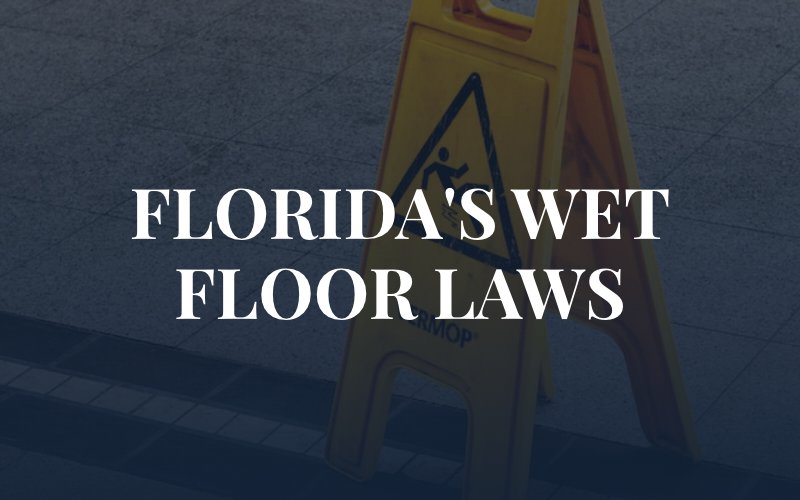
Slip-and-fall accidents happen every day, sometimes resulting in serious injuries. When customers walk into a store or business, they expect the store’s manager or owner to take reasonable measures to keep them safe from harm by promptly addressing safety hazards on the property. We often see warning signs in businesses to alert us to a wet floor after mopping or when there’s a leak, but does Florida law require businesses like stores, restaurants, and hotels to place a warning sign for wet floors?
Liability in slip-and-fall accidents can be complex, and whether or not the business posted a warning sign for a wet floor can become a significant factor in an injury victim’s claim for damages.
Florida has no laws requiring businesses to place wet floor warning signs on their premises to warn customers if there’s been a leak, a recent mopping, or a spill. However, business owners are responsible for providing safe premises for customers. This means they have the duty to quickly recognize and promptly address potential risks, including slippery wet floors. Wet floors are the number one cause of slip-and-fall accidents in Florida. Globally, 55% of falls in businesses result from wet floors. So, while there is no Florida law on the books making it illegal to fail to place warning signs near a wet floor, the business owner is liable for damages when a customer falls due to an owner or manager’s failure to promptly correct, repair, or warn of a fall hazard, including a wet floor. “Damages” in a personal injury case refer to the consequences of an injury caused by another party’s negligence. Damages in personal injury claims can include medical expenses, lost wages, and compensation for pain and suffering.
In Florida, a slip-and-fall accident claim relies on the state’s premises liability laws and the rule of general negligence. Under premises liability laws, a property owner has the duty to recognize and promptly address a safety hazard—especially when a business invites or welcomes consumers to their property for the purpose of making money. Public establishments must operate their business in a way that takes reasonable measures to prevent injuries.
When a wet floor causes someone lawfully on a property to fall and suffer injuries, the injury victim has the burden of proving the business manager or owner acted negligently in allowing a safety hazard to cause injury. This requires documenting evidence to demonstrate the following:
Evidence in this type of claim may include photos, eyewitness testimony, security camera footage, and a business’s history of similar complaints.
In some instances, a customer or patron on a business property might experience a slip-and-fall accident despite the presence of a wet floor warning sign. Does that mean they have no legal claim for their damages? According to Florida’s comparative negligence laws, the injury victim may still be able to claim a portion of their damages minus their percentage of fault for ignoring the warning. However, the presence of a warning sign will directly impact the victim’s case since they had adequate warning of the slippery floor. Depending on the circumstances of the case, such as the distance between the placement of the sign and the place where the victim fell, the details could determine whether or not the victim recovers a portion of their damages or recovers no compensation at all.
On the other side of the issue, if there was no sign present and the store owner should reasonably have been aware of the wet floor, or there was a known history of the problem, such as a leaking ice cream cooler causing the safety hazard, then the victim has a compelling claim for compensation for their damages.
In slip-and-fall cases, our attorneys leverage their expertise to navigate the intricate details of each situation. Whether analyzing the impact of warning signs or establishing the negligence of property owners, Shapiro | Delgado | Hofmann is dedicated to securing just compensation for victims of slip-and-fall accidents. If you’ve experienced such an incident, our legal team in Sarasota and Bradenton is here to guide you through the process and advocate for your rights. Contact us today for a free, no-obligation consultation.